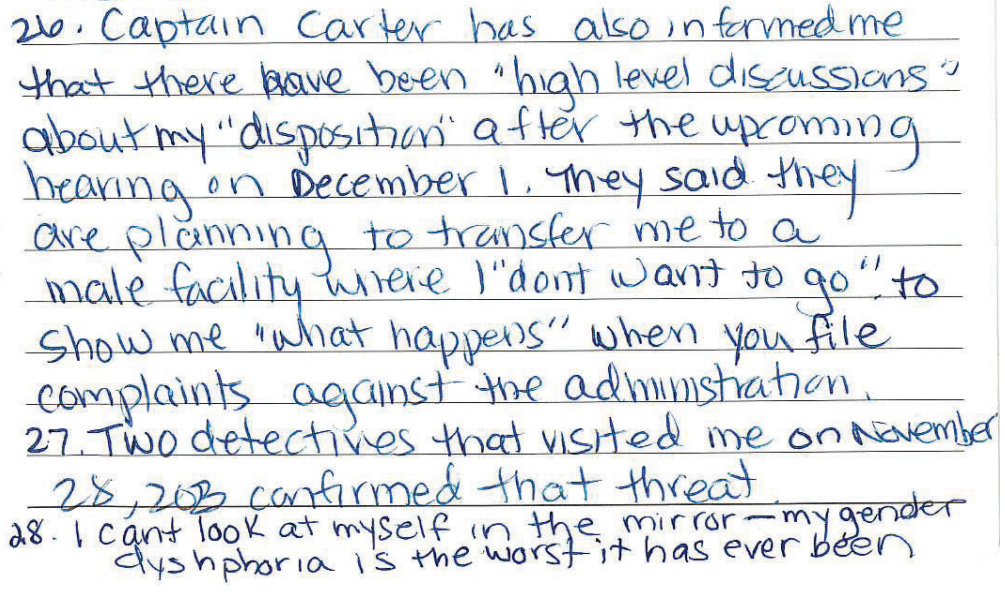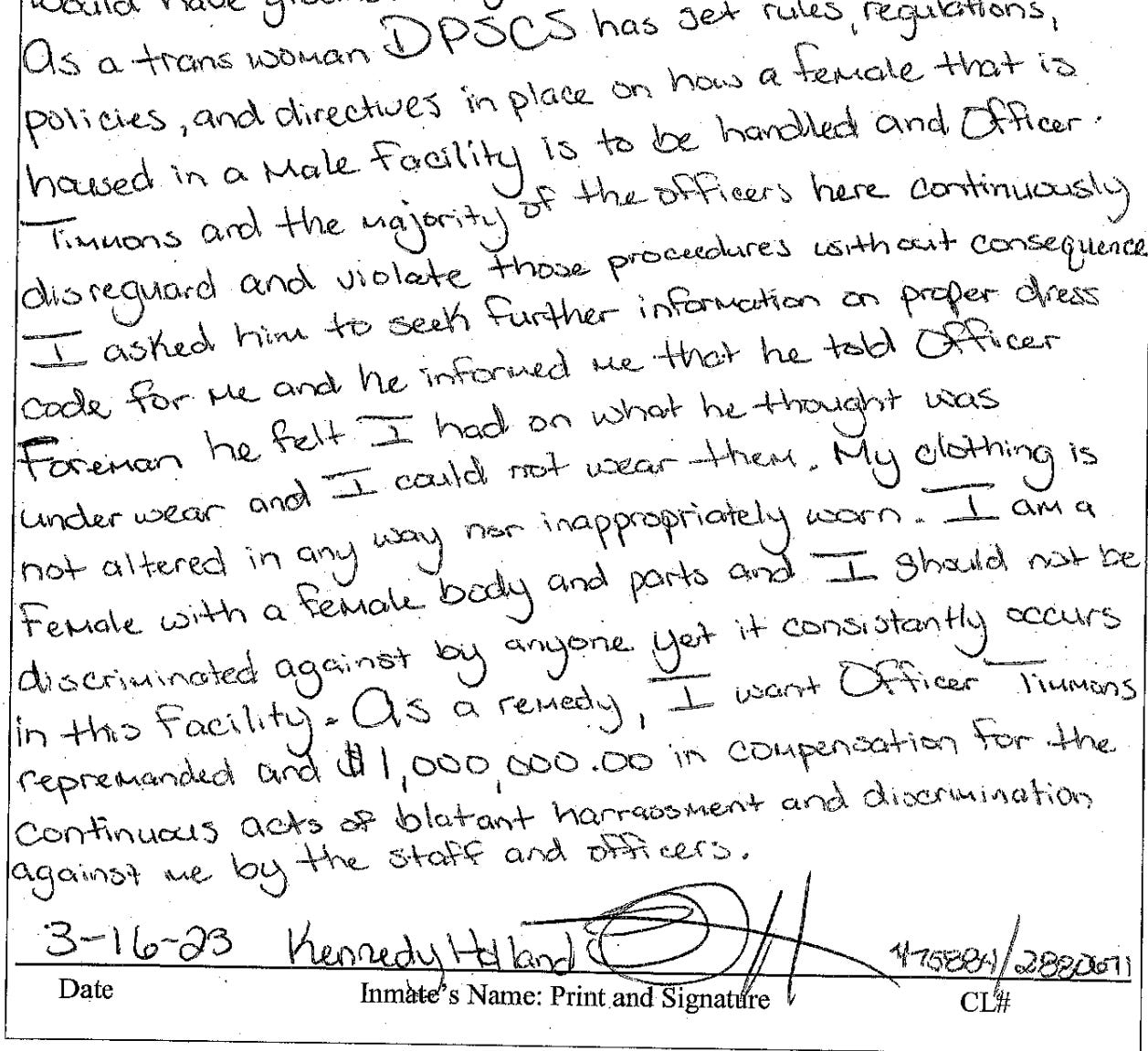"Absolute Terror”: Lawsuit Alleges Maryland Trans Prisoners Face Rape, Medical Detransition, Defied Court Orders, Retaliation, and Torture, Despite AG Brown’s Condemnation of Trump Prison Policy
Gov. Moore's prisons defied a judge’s order to follow standards to keep a woman safe from rape, as AG Brown has mounted "vigorous" defense against her lawsuit and lawmakers sideline meaningful reform
Follow me on Bluesky! (Instagram, Tik Tok)
Tom Sayers contributed to researching and writing this article (Bluesky). Tom is a journalist and audio producer who tells stories about queer and trans identities and investigates anti-LGBTQIA+ hate.

ANNAPOLIS, MARYLAND — One day after Trump’s inauguration, Maryland Attorney General Anthony Brown (D) released a powerful statement in support of trans people following the President’s day-one executive orders targeting the community.
“This is a decision that ignores the humanity and reality of transgender Americans across our State and nation,” Brown wrote about the orders, which included a provision that targeted trans women in federal prisons.
“The president’s mandate…requires federal prisons and shelters to segregate incarcerated people…by their sex, not their gender identities,” said Brown.
“Make no mistake: this Executive Order threatens people’s lives. The Maryland Office of the Attorney General will protect all Marylanders—especially members of marginalized communities—and wants transgender residents of our State to know they belong, they matter, and our Office will fight for their rights and safety.”
But these words came off as insincere to criminal justice advocates in Maryland who have been battling AG Brown’s office in federal court for years over decrepit conditions in the state’s prison system, which operates under policies and conditions similar to those laid out by Trump’s executive orders or those in Florida prisons which we reported on earlier this year.
Four years on from the death of Kim Wirtz, a trans woman who was found dead in her jail cell, trans prisoners in Maryland face deteriorating conditions as attempts at legislative reform move at a snail's pace. The Democratic supermajority in the state legislature has declined to even vote on legislation to meaningfully combat an epidemic of rape and other human rights violations of trans women that plague their prisons.
According to a 2023 report by the Maryland Department of Public Safety and Correctional Services (DPSCS), a state agency under the purview of Governor Wes Moore (D), “All transgender individuals are housed according to physical genitalia.”1 This policy has led to nearly all trans women in Maryland prisons to be housed with men, since only a small percentage of trans women have access to bottom surgery that would allow them to be housed with women under these policies.
The same 2023 report, commissioned by the Maryland legislature, revealed that trans prisoners filed 34 sexual abuse or harassment complaints over three years, despite the prison system only housing an average of 73 trans inmates over the same period of time—over eighteen times the number of complaints filed by cisgender prisoners per capita.2 And this number is certainly an undercount, considering that trans prisoners have been prevented from filing complaints on numerous occasions by prison staff, according to court filings and lawyers for one of the lawsuits against the prison system.
Despite repeated promises for reform, the report reveals that abuse complaints have not declined, and the number of trans people placed in “administrative segregation,” a form of solitary confinement, has skyrocketed.
AG Brown’s office has been defending DPSCS from several lawsuits filed by trans prisoners impacted by these policies, at great cost to Maryland taxpayers. According to a budget analysis reported by the Baltimore Banner, DPSCS paid out $835,000 in settlements to trans prisoners in 2024 alone—nearly 40% of the total settlements paid to all prisoners in the entire system. And that’s not including the legal fees of defending against litigation.
Most of this money went to Amber Canter, a trans woman who was paid out $750,000 by the state after accusing three male correctional officers of putting her in a chokehold while she was incarcerated in one notorious Maryland prison.
A similar lawsuit currently being fought out in federal court, originally filed as Chelsea Gilliam vs. DPSCS in 2023, alleges a pattern of sexual abuse and harassment, neglect, unfair punishment, retaliation, and even torture across Maryland prisons. During proceedings, the state was found by a judge to have failed to comply with parts of a temporary restraining order in the case, similar to the Trump administration’s non-compliance of some court orders this year.
The lawsuit has since expanded from its lead plaintiff, Chelsea Gilliam, to include two additional trans plaintiffs who have spent time in Maryland prisons, Chloe Grey and Kennedy Holland. Kennedy and Chelsea have been released from prison as their lawsuit against DPSCS continues to be litigated, but Chloe has remained incarcerated throughout the case in men’s maximum security facilities, due to her life sentence.
Two of the three plaintiffs are Black, highlighting the intersectional nature of this problem. Black and brown trans people face disproportionate violence from the criminal justice system, even in “liberal” states like Maryland, where Black people make up just 30% of the population of Maryland, but are 72% of the state’s prison population, according to analyses by Maryland Equitable Justice Collective and Maryland Matters.
In a December 2024 ruling by Judge Matthew J. Maddox, the lawsuit’s core constitutional and Americans with Disabilities Act claims survived Maryland’s motion for dismissal. Judge Maddox, a Biden appointee, dismissed some of the other claims without prejudice, but Eve Hill, a lawyer at Brown Goldstein Levy who is representing the plaintiffs, expressed confidence in the strength of the lawsuit.
“The reason [Judge Maddox] dismissed most things was because we couldn’t identify the people who took the action,” she says. “So when we get discovery, which should be able to start soon, we’ll be able to identify those people and [amend the lawsuit] to add them.”
Hill also condemned both AG Brown and Governor Moore for “failing to carry out the very principles they espouse. In short, the Department of Corrections, which they control, is blatantly carrying out the very discrimination and cruelty they claim to oppose, but they do nothing to stop it and, in fact, defend it vigorously.”
In response to an inquiry by MadyCast News, the Maryland Attorney General’s office declined to comment on pending litigation, and said the Attorney General is constitutionally mandated to defend the State and its agencies against litigation.
“The Attorney General also works for the people and is committed to upholding the rights and dignity of the LGBTQ+ community and all Marylanders.”
Maryland’s Department of Public Safety and Correctional Services did not respond to a request for a comment.
MadyCast News is committed to telling the stories of the most marginalized trans people in the country. The stories below, drawn from legal filings, hearings, and testimony, represent just three of the nearly 100 trans women who have been incarcerated in Maryland over just the last few years. Hill told us she believes “virtually all” trans women in these prisons experience similar conditions as those described below.
Please note that the stories below include graphic descriptions of sexual violence, medical detransition, and state-sanctioned humiliation against members of a marginalized identity. If you are sensitive to such language in any way, please exercise caution when choosing to read this article. Maybe share it with a cis friend instead! You can find LGBTQ+ friendly crisis hotlines here, or international hotlines here).
The Endless Torture of Chloe Grey

Maryland’s actions have gone far beyond any conceivable constitutional mandate of either the AG or Governor, and the cruel behavior of prison staff has defied a litany of constitutional and statutory protections afforded to prisoners—and at least one court order. Moreover, the actions and behavior of AG Brown’s legal representatives in this case have bordered on plainly discriminatory and are in contradiction with his stated commitment to “the dignity of the LGBTQ+ community.”
In one sordid months-long ordeal, DPSCS staff openly retaliated against Chloe Gray in the weeks leading up to and months following her hearing for a temporary restraining order against the prison system in late 2023. Chloe is a white trans woman serving a life sentence who began her transition while incarcerated.
According to a handwritten declaration by Chloe, staff denied her meals on four separate occasions and correct doses of her hormonal treatment on five separate occasions in the week leading up to her hearing for the order. Officers also threatened to send her to a dangerous prison to show her “what happens” when she complains.
During the hearing, Judge Maddox expressed dismay at Chloe’s living conditions and ruled that DPSCS must reevaluate her housing placement in a women's facility with consideration for her opinion as to her own safety, and provide Chloe with hair removal cream to alleviate gender dysphoria, which they had denied up until this point. He additionally ordered the prison system to consistently provide her hormonal treatment under video recording. This would prevent medical staff from flouting her prescribed treatment with falsified medical records, as they had up until this point according to a press release by the law firm.
After the TRO, AG Brown’s office spent thousands of taxpayer dollars paying attorneys to defend DPSCS’s decision to defy the court order to provide Chloe hair removal cream—which can be bought over-the-counter for less than $10—by arguing that the cream could be used as “a weapon.” They finally provided her the cream two weeks before a second hearing on the matter. Chloe was never accused of any cream-related crimes, but she continued to have intermittant issues obtaining refills of the cream.
Chloe said a guard told her the Attorney General’s representatives argued that Chloe was too “sexually promiscuous” to move her to a women’s prison, according to filings, and her lawyers said this account lines up with other arguments the office has made in court. Chloe has denied ever having consensual sex while in prison, and has never been attracted to women nor convicted of any sexual crimes. The representatives’ assertion could be seen to be arguing that being a transgender rape victim is a form of sexual promiscuity.
Prison staff followed up on their earlier threat of retaliation against Chloe for going to court by immediately transferring her to a more dangerous prison without asking for her input, in a brazen violation of Judge Maddox’s order, which had ordered the prison system to reevaluate Chloe’s housing placement using DPSCS and PREA standards that mandate considering her opinion as to her safety in the new placement.
Her new prison, North Branch Correctional Institute, was the same prison that housed Amber Canter, whose eye socket was allegedly fractured by three prison guards in a brutal assault, and was described by Chloe as “vehemently anti-LGBTQ.”
The specific compound in the prison she was transferred to was particularly dangerous—Chloe testified that a prison gang had an alert out to “kill or injure any LGBTQ inmates that enter the compound.” She also testified that the only two other transgender inmates she knew of had “de-transitioned for their safety and become Muslim.”
To compel compliance with the court order, Chloe’s lawyers filed a motion against DPSCS to enforce the TRO—the same kind of motion filed against the Trump administration in cases where his administration has been accused of violating court orders.
In a hearing for the motion in June 2024, representatives for DPSCS conceded that they had not asked for Chloe’s opinion when denying her request to be transferred out of NBCI to a women’s prison.
Chloe had, once again, been forced to live in solitary confinement for months before the hearing, a decision which Judge Maddox described as “perhaps starkly in violation of PREA standards” that cap such confinement to 30 days, and a length considered torture by the United Nations.
Maddox agreed with Chloe’s lawyers that DPSCS had not been in “full compliance” with his ruling in a hearing, and ordered the prison system to reevaluate her housing without solely relying on her genitals.
The justice further agreed to order prison staff not to retaliate against her for the lawsuit, after Chloe’s lawyers told him prison officers had threatened her life on the way to the hearing in a slur-ridden tirade, which the mild-mannered judge described as “startling” and “kind of outrageous.”
You are gonna pay the price when this court stuff is over…she is a fucking bitch-ass f****t and a fucking sick fuckboy and no one believes her….
We could open up the cells up and say it was an accident. It happens all the time, you fucking fairy. We should let these N-words [sic.] out and wear your fucking ass out, you fucking fairy. That’s what you want, and you’re just a f****t and no one believes you.
It’s highly unusual for a judge to order employees of a state agency not to commit violent crimes against an individual, but Judge Maddox felt compelled to take that step due to the extreme nature of the circumstances.
In the months since the order, DPSCS complied with the order not to murder Chloe, but refused to transfer her out of NBCI by accusing her of violating PREA policy, an allegation with “no evidence in the record” according to correspondence from her lawyers. This led to further status conference hearings between the parties in front of Judge Maddox to consider improvements to her living situation, but DPSCS has continued to deny her a transfer to a woman’s facility to this day.
An amended lawsuit complaint filed by Chloe and other plaintiffs in July 2024 tells the full story of how she had been sadistically abused by officers and prisoners for years prior to the original TRO at the end of 2023.
When I initially began to transition, I was forced by the staff to out myself to my entire housing unit of men, which immediately put me in an impossible situation. I was ridiculed 24 hours a day. I was constantly propositioned for sex. I was constantly pressured and threatened for sex, and it became a struggle just to survive day-to-day. [Excerpt from Direct Examination with Chloe Gray, November 21, 2023]
In 2022, Chloe says she was sexually assaulted in her housing unit at Western Correctional Institute by a man who “grabbed her breasts and buttocks and urged her to ‘play ball’ with him.” A nearby staff member looked the other way and when Chloe complained to the then-housing manager, he refused to file a PREA complaint about what had happened.
After this incident, Chloe said staff placed her in a cell with a man “who was known for raping his cellmate,” who subsequently tried to rape her. A correctional officer intervened before he was able to do so but then refused to discipline the cellmate.
Chloe was again denied a PREA complaint because, according to the psychologist at her prison, that “isn’t what [we] do here.” Chloe’s cellmate attempted to rape her again, which finally led to her getting her own cell, where—according to the lawsuit—men “would wait for her in her cell to demand sex from her.” She became frightened to return to her cell.
Chloe faced a litany of discrimination in other aspects of prison life as well. The complaint says that after she began her transition, staff fired Chloe from her position as an assistant in the educational department that she had held for three years, citing “fears” that she would be too “sexually promiscuous.” Her hormone treatment at WCI was consistently “delayed, denied, and inconsistent,” according to Chloe, which led exacerbated gender dysphoria
Eventually, she was placed in solitary confinement at WCI, supposedly for her safety. But Chloe told the courtroom in a direct examination that she did not feel safe, and chose to sign a “body waiver” and leave after a month.
Q. And what led you to leaving administrative segregation at WCI?
A. Absolute terror and self-preservation. I personally know trans women that have been murdered in segregation at WCI and recently with that time, and segregation is used for retaliation against people as myself that file PREA complaints. It's an extremely dangerous environment, especially for a transgender woman
Chloe then recounted how after leaving solitary confinement, prison staff wasted no time in putting her back into danger.
I immediately was placed in the cell with a 290-pound convicted sex offender who immediately physically assaulted me and attempted to rape me within less than 20 minutes of being in the cell.
This constant stream of false “choices” presented to Chloe reflects a broader trend of trans women in prisons being placed in “‘lose-lose’ situation[s] insofar as transgender women perceive choices, but no choice leads to a net gain in terms of personal safety,” as written by Dr. Valerie Jenness, a Professor of Criminology at UC Irvine who provided expert testimony for the lawsuit.
After being transferred to another prison called Patuxent in 2023, Chloe claims staff at the prison often “forgot” to let her shower on her own, and quipped “don’t you like boys?” when she requested for the legally required accommodation. As a result, she sometimes went days without a shower.
Chloe says she was sexually assaulted when a man in her housing tier—a tier where people should be cuffed when outside of the cell—entered Chloe’s cell, pulled out his penis, and tried to get her to perform oral sex on him. The assistant warden blamed her feminine appearance.
After her sexual assault, Chloe was held in administrative segregation for a month, where she felt “dehumanized” and “punished” for being trans and for DPSCS’ own failure from protecting her, leaving her feeling depressed and isolated.
After a month in administrative segregation, Chloe was released only because she signed a waiver of liability sometimes referred to as a “body waiver” by prisoners.
Leigh Goodmark, Associate Dean at the University of Maryland Francis King Carey School of Law and author of several feminist books criticizing the criminal justice system, explains that “people are so desperate to get back into the general population where you can have access to programming, commissary, and you can live a normal in-prison life.” She says “It should not obviate the prison’s responsibility to keep people safe. It’s an impossible choice to say, we acknowledge we won’t be able to keep you safe and when you get hurt, we will not be liable.”
After more than eight months of solitary confinement at NBCI during the course of proceedings to enforce the TRO in 2024, Chloe was finally transferred back to WCI prison, where her living conditions have not meaningfully improved, according to her lawyer. However, she now has a single cell in the men’s prison, and receives consistent dosages of her hormones and hair removal cream.
Additional written complaints submitted by Chloe attached below.
The Merciless Dehumanization of Chelsea Gilliam

Chelsea Gilliam began her medical transition almost two decades before her incarceration, in 2003. She was incarcerated as a pretrial detainee for six months between 2021 and 2022, having never been convicted of a crime. Prison staff never consulted Chelsea on what they could do to maintain her safety, and forced her to shower with men.
While held in Baltimore City Correctional Center (DPSCS denies she was ever incarcerated there), Chelsea alleges she was physically and sexually assaulted in the shower by a man in the same housing unit.
According to Chelsea, the man in question, identified just as Christopher, “sexually propositioned her,” but she refused, “in fear of him.”
“[Chelsea] avoided [Christopher] in the showers until he threatened her life and told her ‘Bitch, get up and take a shower…[he]’ threatened her with a knife and sexually assaulted her by masturbating against her and digitally penetrating her anus.”
Chelsea reported the assault twice to staff, but they took no further action. Eventually, she was able to see the PREA Coordinator about the matter, who recommended DPSCS should allow her the privacy to go to recreation and shower alone, rather than at the same time as men in the prison. But the lawsuit alleges that “staff refused to honor those accommodations.”
Throughout this entire process, Chelsea was also dealing with being forcibly detransitioned by prison staff at BCCC who refused to administer her weekly hormone treatment. It was only following her sexual assault in the shower that Chelsea’s hormone treatment was restored.
Her skin broke out as facial hair reemerged, causing her to scratch and scar her neck. She felt frustrated and sad when she looked at her body. (Fourth Amended Complaint)
At the end of Jan. 2022, Chelsea was given a single cell. Staff “periodically brought male inmates to her cell to see if they would room with her,” the lawsuit states. When they reacted badly, staff would laugh. This occurred until eventually, she was again placed with a male cellmate.
Although the lawsuit does not mention the term, her treatment is reminiscent of “v-coding,” a common practice by prison staff that studies have described as the intentional placement of trans women with sexually violent men to “pacify” their sex drives with an easy target for repeated and constant rape.
Throughout her incarceration, Chelsea was misgendered by DPSCS staff and called by her deadname. Other people in the prison refused to talk to her “for fear of being harassed,” and her dorm leader complained about Chelsea being naked and for showering as a woman.
While at Maryland Reception Diagnostic and Classification Center, Chelsea was kept in solitary confinement “solely because she is transgender” for 3 months, from Feb. to May 2022. She recalls this placement as “feeling punitive, like she did something wrong and was being maliciously punished for that perceived wrong.” Throughout her segregation, Chelsea had her wrists shackled to her waist and down to her feet whenever she left her cell, and was denied access to routine programming.
“Because the prison system can’t keep trans women safe, they are punishing them by putting them in segregation,” says Goodmark.
Chelsea routinely faced retaliation from staff as well. She was told “You are a man and you are in jail,” when she complained about not receiving a PREA screening to measure her risk of sexual victimization. Throughout her incarceration, Chelsea was “repeatedly harassed” by prison staff, including being routinely called by her deadname.
Chelsea’s lawyer says the misgendering and deadnaming is “not just an oversight, they’re using it to harass people.”
Chelsea continues to live outside of prison as the lawsuit proceeds with her claims of monetary damages for these allegations.
The Years-Long Humiliation of Kennedy Holland

Kennedy Holland is a trans woman who transitioned 15 years before her incarceration, in 2003. She was incarcerated in various prisons between her arrest, conviction, and eventual release between 2018 and 2023. Throughout her incarceration, she was similarly consistently put in danger of sexual assault by prison staff, who broke a promise not to place her in cells with male prisoners.
A man living in the cell next to Kennedy once told her “We can do anything we want with you”. Despite this incident, Kennedy was forced to stay living next to him until she was transferred to another facility.
In another incident, a prison officer opened up the gate of her shower while she was unclothed and told other prisoners to “come and watch it [referring to Kennedy] shower.” The PREA coordinator dismissed the ordeal as “not a big deal.”
Officials also placed Kennedy into solitary confinement on multiple occasions on account of her gender identity and as retaliation for complaining about her treatment by DPSCS staff, including being housed with men. She describes the experience as feeling punitive.
Kennedy also faced discrimination when looking for work, such as when she was rejected by staff for a job opportunity she applied for because “the transgender community will be sexually promiscuous in situations where the security is not as high,” according to the complaint
How can advocates finally achieve meaningful reform?

The conditions in Maryland prisons for incarcerated trans people have been pushed aside by the media and political establishment for far too long. And Trump’s executive orders may strip away what little protections trans prisoners in Maryland have under federal law, according to Jamie Grace Alexander, a community paralegal at Baltimore Action and member of the Trans Rights Advocacy Coalition.
Regulations under the Prison Rape Elimination Act provide some guidance that housing for trans prisoners should be made on a case-by-case basis, with consideration for their opinions as to their safety. However, these rules conflict with Maryland state policies that require trans women to have had bottom surgery to be housed with women. Moreover, the Trump administration plans to scrap the rules, which has left advocates feeling gravely concerned.
The current PREA regulations provide the legal backing for advocates to be able to assert that “trans people shouldn't be raped and assaulted in prison,” according to Jamie Grace Alexander, a community paralegal at Baltimore Action and member of the Trans Rights Advocacy Coalition.
The potential loss of those federal protections exacerbates the need for state legislative action, which some states have already taken. California legislators passed a bill allowing trans and intersex inmates to request to be housed according to their gender identity that went into effect in 2021, after a 2007 study found that 48% of trans prisoners faced “undesirable sexual acts” in California prisons—37 times the rate of their cisgender counterparts.
However, a similar bill that was introduced in the Maryland legislature in 2023 with the help of trans advocates like Alexander never received a vote, and has not been reintroduced in the years since.
The Transgender Respect, Agency, and Dignity Act would have provided more agency and rights to trans and gender nonconforming individuals regarding their own safety, and would prohibit the punishment of incarcerated people with solitary confinement in retaliation for a stated fear for their safety.
Earlier this year, the Maryland legislature threatened $100,000 of DPSCS funding if the agency did not provide them with additional reports and data on the treatment of transgender prisons.
But this back-and-forth between the legislature and DPSCS has gone on for years without any real progress, which shows how legislators underestimate the severity of the problem and the unwillingness of the department to truly reform itself without stronger legislation. “The way trans people are being treated in prison was urgent four years ago,” says Alexander.
The state’s LGBTQIA+ commission has not addressed the issue either. A statement they adopted last month about Trump’s executive orders has no advice for trans prisoners, and does not call for reform on the issue. When asked for a comment in January, the commission redirected us to the AG office, and stated they are working with the Governor, AG, and state agencies to “ensure that transgender and LGBTQIA+ communities are protected and supported.”
Readers in Maryland may want to consider sending the information revealed in this article to their state legislators and demand real change. With over 70% of the seats in the body, Maryland Democrats have no excuse to continue to kick the can down the road.
But lobbying politicians might not be enough—activists who want to act with the urgency this problem demands could take inspiration from our reporting on lessons learned by ACT UP activists, who protested prisons to demand better medical treatment of LGBTQ prisoners with HIV/AIDS between the 1980’s and 2000’s.
And even legislative action might not be enough to solve the problem alone. Department staff who make housing decisions must be willing to engage with trans people with empathy and true consideration of their opinions and experiences with regards to their safety in order to mitigate these issues under any set of laws. But that requirement for empathy requires real, genuine buy-in from staff across prisons, from the top to the bottom.
Testimony opposing the 2023 trans prisoner reform bill from the president of a professional organization that represents “correctional administrators” exemplifies how any fig leaves of reform offered by prison leadership in Maryland to the legislature are not made in good faith, as the system is run by people who can’t even hide their personal animus against trans people.
MaryAnn Thompson, President of the Maryland Correctional Administrators Association, wrote:
The LGBTIQA [sic.] community typically uses 72 pronouns. However, pronouns can exceed this number due to the accepted practice of creating pronouns that an individual wants to be identified by. This could cause the need for additional training to educate staff of pronouns, pronunciations, etc.
Sam Williamson, an attorney at Public Justice and member of the Trans Rights Advocacy Coalition, believes Thompson’s attitude towards trans people “speaks to a culture of resistance and disrespect” among prison staff.
Beyond just legislative action, Maryland’s executive branch, currently led by Gov. Moore, must take firm action to enforce the rule of law in state agencies by aggressively disciplining members of DPSCS staff and leadership who violate court orders, retaliate against rape victims who file complaints, or abuse trans prisoners with violence, misgendering, or deadnaming.
Trans prisoners matter.
Every form of discrimination trans people face in the outside world today is elevated to its most extreme form in carceral environments. People in prison denied medical care can’t find alternative sources for treatment like others can—they are forced to suffer and watch and feel their body slowly detransition. They can’t apply to other jobs once rejected from the few available to them behind bars. And they have little recourse to sexual violence, as lawsuits like these are extremely costly and inaccessible to most.
“I think a lot of times when people talk about supporting the trans community—or any community—they often leave out incarcerated people,” says Williamson. “Incarcerated people are demonized and forgotten about.”
AG Anthony Brown has failed the people of Maryland by allowing his staff to wage costly legal battles against trans prisoners in his state that have been found to defy a court order, as well as basic human decency.
It's important to note that even though some prisoners have been convicted of violent crimes, trans prisoners are not being punished for their crimes with this kind of disparate treatment—they are being punished for being transgender. It would be unthinkable to have a debate over whether cis women should ever be housed in cells with violent men, even if they have been convicted of murder or crimes against children.
“The punishment of prison is supposed to be the loss of liberty, not the loss of safety, not the loss of your bodily integrity, not the loss of your dignity, not the loss of your health,” says Goodmark. “When we incarcerate people, we entrust the state with their care, and the state is failing.”
Scroll to the bottom for bonus content!
Epilogue by Mady Castigan
When I wrote our first article covering the treatment of trans prisoners in Florida earlier this year, the level of open cruelty and abuse the prisoners faced in those conditions shocked me to my core. I did not think it was possible for conditions for trans people to be worse than the conditions in those prisons, but I was wrong.
Although Maryland has not yet strapped trans women down into chairs for forced buzzcuts, its prison system in many ways fails trans women worse than even Florida’s. Reiyn Keohane’s mistreatment, as horrific as it was, did not involve her being intentionally placed with sex offenders who would rape her—she and many other trans women in Florida prisons are allowed a single cell and private access to a shower.
At no point did Florida prisons openly defy a federal court order, or accuse raped women of being sexually promiscuous by the virtue of being transgender rape victims. And as evil and violently transphobic Florida state officials are, at least they do not wear two faces and pretend like they care about the dignity transgender people to the public.
If you're a Marylander outraged at this story, I implore you to take direct and immediate action to combat the mistreatment of these prisoners. And if you’re not, find out what happens in your prisons, and take action there—it’s likely not much better.
Prisons are spaces where society shows transgender people what they really think of us, when they think no one is watching. Every trans person has experienced a situation where they felt merely tolerated by someone afraid of the consequences of bigotry. In prisons, there are no consequences for hatred.
Trans prisoners, disproportionately Black and brown, are on the frontlines of the resistance to the government’s fascist agenda against transgender Americans. Maryland's consistent refusal to act to stop this humanitarian catastrophe is yet another example of how this extermination campaign has increasingly grown to become bipartisan in its nature. And if we do not defend the frontlines, they will come for us all.
Donald Trump has already shown us that he has no regard for due process or rule of law. He has threatened to send American citizens to El Salvadoran prisons whose conditions have been described as “penal colonies" by some experts. If you think he will stop at Tesla vandals, you are sorely mistaken.
If we don't hold the front lines and support the women in prison who may have been convicted of crimes, no one will come to save us once we are facing the full strength of the carceral state for the crime of being transgender.
—Mady
PS: This article was researched and written over several months by two people. Due to our firm commitment to pay trans journalists a living wage, the costs of this article have approached nearly $1000 already—nearly 1/3rd the revenue we’ve had so far. If you want to enable us to continue this important investigative journalism—which almost no one else is doing—please consider supporting us with a free or paid subscription. Just to break even, I estimate we need around 15 paid yearly subscriptions—and you can increase your impact by donating on Ko-fi, which has a lower platform fee.
You can also gift a subscription to a friend, donate a higher amount for a “founding member” subscription, or even just share a link to this article on your social media page. Free subscribers will receive free paid subscriptions for sharing the article on their social media with the link generated by the “share” button while logged in. Everything helps!
Paid subscribers also gain access to bonus content and our community Discord! Check out the bonus content for this article below.
This policy may conflict with other DPSCS policies that say a trans women with bottom surgery can be placed in men’s prison under certain conditions.
34 reports per average trans prisoner population of 73 over three years=0.465, vs 421 reports for the average total population of 17000 over three years=0.0248. Ratio calculated as 0.465 / 0.0248 => 18.75 higher per capita rate.






Incredible, necessary reporting. Thank you for this.